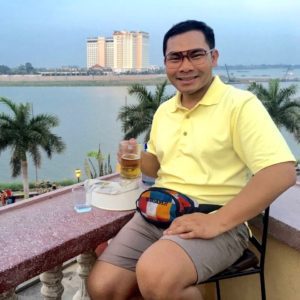At the League of Education Voters (LEV), we recognize all of the hard work that you do toward improving public education across Washington state. We are pleased to announce our Activist of the Month for March: Sameth Mell. Read about his experience as a strong advocate for education, housing, and immigrant communities.

Sameth Mell is an active leader with the Coalition of Immigrants, Refugees & Communities of Color (CIRCC), serving on the leadership and advocacy committees. He works for the Mount Baker Housing Association as the Outreach & Resident Services Manager, helping residents access needed services and programs, and helping them to engage in their community. He is also responsible for connecting the agency at large to community based organizations and public officials, and works on legislative materials. He is a community activist extraordinaire on behalf of the Cambodian community and many social justice issues that the community faces.
Sameth supported the Campaign for Student Success (C4SS) by adopting its three principles of funding and fairness, talent, and accountability as part of CIRCC’s advocacy agenda for this year, along with other priorities that focus on housing development for communities in South Seattle, opposition to building a new youth jail, and ending fines for formerly incarcerated people that often prevent them from being able to support themselves.
After he put together CIRCC’s advocacy agenda, Sameth then scheduled C4SS group meetings with four Seattle City Council members to date, and seven state legislators. As a small group, C4SS met with council members Burgess, Johnson, Herbold and Harrell. Each time, C4SS had thoughtful conversations with the council member about the priorities on our advocacy agenda, and C4SS has asked the council member to sign onto the Campaign for Student Success. Of the four, one has signed on so far. Sameth is now working on setting up more appointments with the remaining Seattle City Council members.
Sameth was born in a refugee camp in Thailand after his parents fled the Khmer Rouge genocide in Cambodia. After his father died in the camp, his mother signed up to relocate him and his three siblings to the United States in 1985.
Living in poverty in mid-1980s Seattle, Sameth wondered why he was transferred from High Point Elementary School near his home and bused to Lafayette Elementary seven miles away. He didn’t understand the policies then.
Sameth became involved in Asian Counseling and Referral Service’s APIRA (Asian Pacific Islander Rising Above) program in his teen years, and started to recognize his Khmer identity as being important to him. He began working on identity politics, recognizing racism and oppression and addressing more of that as he grew older. Sameth says, “I saw organizing as a way to effect change and create equity for my community members.”
In addition to C4SS, Sameth is working with the Cambodian-American Community Council of Washington State to create scholarships. They have strong advocates from the education sector working on the education subcommittee, particularly around mentorship to help students continue to higher education. He hopes to have conversations with elected officials about helping support Cambodian-Americans attain degrees and certificates, and share stories about the Khmer Rouge genocide.
When Sameth went to high school, there were only two paragraphs about the Khmer Rouge genocide in his history books. He would like to see an education mechanism to educate the general public about the genocide so that his community can take pride in overcoming that, and draw attention to its implications in today’s political climate. He says, “Refugees don’t come to America because they just want a better life. My mother never asked to be here. We had no choice but to survive.”
Sameth says all the issues he works on intersect. In addition to C4SS, he is supporting the creation of a Filipino Community Center, construction of the Mount Baker Gateway Project to build 250 affordable housing units in Southeast Seattle, and the Model Toxics Control Act (MTCA). He says, “We’re rewriting the narrative – ecology equals affordable housing. If we want to build on a space contaminated by solvents, we need to get MTCA funds to make that happen.”
His overall plan is create spaces where people can live, celebrate their cultures, and have access to quality education. After all, Sameth says, “We have along Rainier the most ethnically diverse neighborhood in the country.”